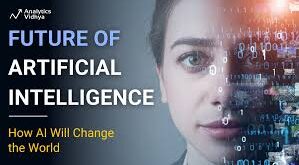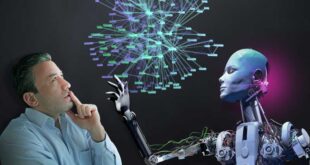Introduction
Artificial Intelligence (AI) is no longer a concept confined to science fiction novels or futuristic movies. As we step into 2024, AI has become an integral part of our daily lives, quietly transforming the way we work and interact with technology. From smart assistants that help us manage our schedules to advanced algorithms that drive decision-making in businesses, the influence of AI continues to grow exponentially.
This powerful technology has evolved rapidly over the past few years, leading us to wonder how it works and what lies ahead. What does this mean for various industries? How will AI shape job markets? And what ethical dilemmas accompany its rise? Join me as we explore these fascinating questions and unravel the intricate workings of artificial intelligence in 2024.
Advancements in AI Technology
Artificial intelligence has seen remarkable advancements recently, reshaping the technological landscape. Enhanced machine learning algorithms are now enabling systems to learn from vast amounts of data with unprecedented speed and accuracy.
Natural language processing has also made significant strides. AI can understand and generate human-like text more effectively than ever before. This capability is revolutionizing customer service through chatbots that provide instant assistance.
Vision systems have improved too, allowing machines to interpret images and videos accurately. From facial recognition to autonomous vehicles, applications are expanding rapidly.
Moreover, quantum computing is on the horizon, promising even greater computational power for AI tasks. This could unlock new possibilities in research, healthcare, and beyond.
These innovations underscore a future where AI not only supports but actively enhances our daily lives across various sectors.
Applications of AI in Different Industries
Artificial intelligence is making significant strides across various sectors. In healthcare, AI algorithms analyze medical data to improve diagnostics and personalize treatment plans for patients. This technology helps doctors make quicker decisions based on vast amounts of information.
In finance, AI detects fraudulent transactions in real-time. It assesses risks and automates trading strategies, ensuring efficiency throughout the industry. The ability to process complex datasets enables a more accurate prediction of market trends.
Retail is also embracing AI through enhanced customer experiences. Chatbots provide instant support while recommendation engines suggest products tailored to individual preferences.
Manufacturing has seen automation rise dramatically due to AI-driven robots, which streamline production lines and reduce costs. These advancements help maintain high-quality standards while increasing output rates.
The transportation sector benefits from AI with self-driving vehicles optimizing routes and improving safety measures on the roads. Each application illustrates how integral artificial intelligence will become in shaping industry practices moving forward.
Impact of AI on the Job Market
The impact of AI on the job market is multifaceted. On one hand, automation and intelligent systems are streamlining processes in various sectors. Tasks that once required human intervention can now be handled more efficiently by machines.
This shift leads to a transformation in job roles. While some positions may vanish, new opportunities arise. Industries evolve as they adapt to these technological advancements.
Workers need to reskill or upskill to stay relevant. Embracing lifelong learning becomes essential in this dynamic landscape. Adaptability is key for individuals seeking growth amid change.
Moreover, AI also enhances productivity across teams. It enables workers to focus on creative and strategic tasks rather than repetitive ones, fostering innovation.
However, there are concerns about inequality arising from this transition. Not everyone has equal access to training resources or technology, raising important questions about fairness in the workforce landscape.
Ethical Concerns Surrounding AI
As artificial intelligence continues to evolve, ethical concerns are becoming increasingly prominent. Many worry about the implications of AI decision-making processes. Who is held accountable when an algorithm makes a mistake?
Privacy issues also loom large. With vast amounts of data collected, individuals often have little control over their personal information. This raises questions about consent and transparency in how data is used.
Bias in AI systems is another critical concern. If algorithms are trained on skewed data, they may reinforce societal inequalities rather than alleviate them. Ensuring fairness in AI applications requires vigilant oversight and continual assessment.
Moreover, there’s a fear that widespread automation could undermine human creativity and intuition in various fields. Balancing technological advancement with ethical responsibility poses significant challenges ahead for developers and policymakers alike.
Predictions for the Future of AI in 2024
As we look ahead to 2024, the landscape of artificial intelligence is poised for remarkable changes. One significant trend will be the enhancement of natural language processing capabilities. This means AI systems will understand context and nuance even better, making human-AI communication seamless.
We can also expect a surge in AI-driven automation across various sectors. Industries like healthcare and logistics will leverage intelligent systems to optimize operations, reduce costs, and improve service delivery.
Additionally, personalized experiences powered by AI algorithms are on the rise. From tailored learning solutions in education to customized marketing strategies in retail, businesses are increasingly using AI to meet individual needs.
Moreover, ethical frameworks around AI usage are likely to evolve. As society grapples with concerns about data privacy and bias, regulations may become stricter to ensure responsible deployment of these technologies.
Conclusion
Artificial intelligence continues to reshape our world in profound ways. As we move through 2024, its integration into various sectors is becoming more robust and sophisticated. From healthcare innovations that enhance patient care to automated systems transforming manufacturing processes, the reach of AI is vast.
While advancements bring numerous benefits, they also raise questions about job displacement and ethical considerations. Businesses must navigate these challenges responsibly as they adopt new technologies.
The future holds great promise for artificial intelligence. With ongoing research and development, we can expect even greater capabilities and applications on the horizon. The journey of AI is just beginning, and it will undoubtedly play a pivotal role in shaping our lives in the years to come. Embracing this evolution with awareness will be crucial as society adapts to the changes ahead.





